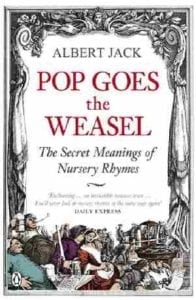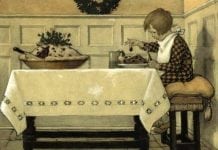Here we go round the mulberry bush,
The mulberry bush, the mulberry bush;
Here we go round the mulberry bush,
On a cold and frosty morning.
This is the way we wash our clothes,
Wash our clothes, wash our clothes;
This is the way we wash our clothes,
On a cold and frosty morning.
This is the way we iron our clothes,
Iron our clothes, iron our clothes;
This is the way we iron our clothes,
On a cold and frosty morning.
This is the way we scrub the floor,
Scrub the floor, scrub the floor;
This is the way we scrub the floor,
On a cold and frosty morning.
This is the way we mend our clothes,
Mend our clothes, mend our clothes;
This is the way we mend our clothes,
On a cold and frosty morning.
This is the way we sweep the house,
Sweep the house, sweep the house;
This is the way we sweep the house,
On a cold and frosty morning.
This is the way we bake our bread,
Bake our bread, bake our bread;
This is the way we bake our bread,
On a cold and frosty morning.
This is the way we go to church,
Go to church, go to church;
This is the way we go to church,
On a cold and frosty morning.
Here we go round the mulberry bush,
The mulberry bush, the mulberry bush;
Here we go round the mulberry bush,
On a cold and frosty morning.

Albert Jack’s bestselling Pop Goes the Weasel
The mulberry bush has had its place in legend for hundreds of years, most famously in the tragic story of Pyramus and Thisbe, a version of which is told by the Latin author Gaius Julius Hyginus (c.64 bc–ad 17) and, centuries later, camped up in comic fashion by Bottom and companions in William Shakespeare’s A Midsummer’s Night Dream.
The tale is set in ancient Babylon, where two children, Pyramus and Thisbe, grew up as next-door neighbours.
As the years passed and they became young adults, the pair fell in love, but their parents forbade them to see each other. Instead, the lovers communicated secretly through a hole in the wall that separated their two houses. One night they decided to run away together and marry in secret.
Pyramus described to Thisbe a location marked by a mulberry bush. She arrived at the rendezvous first but, while she was waiting for Pyramus, she was scared by a passing lion, its jaws still bloodied from a recent kill.
In panic, Thisbe dropped her cloak and ran to hide in a nearby cave. When Pyramus arrived, he found his lover’s bloodstained cloak on the floor and fresh lion tracks all round.
He had always been hot-headed and, overcome with grief that his sweetheart appeared to have been eaten by a lion, he unsheathed his sword and stabbed himself in the heart. Meanwhile Thisbe had been waiting to make sure the lion really had gone, and as soon as she thought it was safe, she returned to the mulberry bush, only to discover what her lover, the fool, had done.
Every bit as impulsive as her beloved, she tugged the sword out of Pyramus’s heart and plunged it into her own, spraying blood – both hers and his – all over the white mulberries. In tribute to the lovers, the mulberries remained red, instead of white, and have stayed this colour ever since.
The moral of this story clearly is: don’t kill yourself for love. (Not that lovers ever heed such advice, as the star-crossed Romeo and Juliet – in another of Shakespeare’s plays, with a very similar ending to this ancient tale – make quite plain.)
‘Here We Go Round the Mulberry Bush’ is one of the many ‘repetitive’ nursery rhymes that can easily be adapted and added to, and probably has been many times over the years, to suit any occasion.
There are similar versions in Holland and Scandinavia, although a juniper bush is understandably substituted for a mulberry bush in those rather colder countries. This song could be extended to last all day if necessary. Essentially, it’s a worker’s song devised to pass away the time and improve morale.
For example, working miners might sing ‘This is the way we dig for coal, dig for coal, etc.’ and a version for soldiers might go ‘This is the way we march to war’. Sailors might sing ‘This is the way we mend our sails, mend our sails’ while school children might chant ‘This is the way we brush our teeth’, and so on.
For the origins of the nursery rhyme, we need to travel to the unlikely setting of HMP Wakefield and the exercise yard.
According to R. S . Duncan, a former governor of Wakefield and author of a fascinating history of the prisons that have existed on the same site for over five hundred years, the mulberry tree in the exercise yard provides the root (or roots) of this long-standing rhyme.
Mulberry trees have been associated with prisons since the early nineteenth century, when many prison governors entered the profitable British silk industry, mulberry leaves being the preferred food of silkworms.
Duncan insists that, back in the days when Wakefield was a House of Correction, female prisoners used to walk their children around the mulberry tree planted in the courtyard and devised the rhyme to help pass the time and keep the children occupied. According to the Wakefield tourist office, a mulberry tree thrives to this day within the prison grounds.
With the possibility of the rhyme being written in prison, its meaning changes to something much darker. After all, it’s not summer but a cold and frosty morning.
The activities listed in the song are no longer simple chores but a catalogue of wearisome tasks performed by a female prisoner in a House of Correction: washing, ironing and mending clothes, scrubbing the floor, sweeping and baking bread, all topped off with a compulsory visit to church.
The repetition within the verse (This is the way we scrub the floor, / Scrub the floor, scrub the floor) emphasizes the dreary endlessness of the tasks – ones that have to be done a certain way. More than just a worker’s song, ‘Here We Go Round the Mulberry Bush’ would seem to be the nursery-rhyme equivalent of a song chanted by a chain gang – Albert Jack
Albert Jack AUDIOBOOKS available for download here

Pop Goes the Weasel – Nursery Rhyme History





































